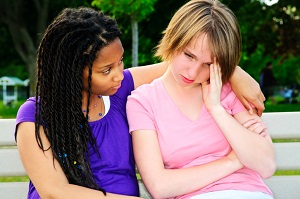 Have you ever felt upset about something and just wanted somebody to listen to you? Even I, as a therapist who helps and guides others to listen to each other day in and day out, can find it hard to relax the impulse to do more than listen—to try to do something. Yes, part of it is because I care. But it’s also because it can be hard to sit with how I feel to see another suffer.
Have you ever felt upset about something and just wanted somebody to listen to you? Even I, as a therapist who helps and guides others to listen to each other day in and day out, can find it hard to relax the impulse to do more than listen—to try to do something. Yes, part of it is because I care. But it’s also because it can be hard to sit with how I feel to see another suffer.
Trust me, I intimately know the misunderstood feeling I have when someone’s anxiety gets triggered by my expression of some minor suffering I’m experiencing. I know the feeling of wishing my uncle could just listen to me or give me a hug when he, instead, tells me what I should do or, worse, tells me some universal truth, such as, “It’ll get better.” I know he’s only trying to help me and shielding himself from his own discomfort at seeing his nephew not perfectly OK, and I love him for it regardless. I know this doesn’t sound like it has much to do with therapy, but I believe it does—and on a deeper level than just a therapist not solving a client’s problems. The realm of the intra-client relationship, the way one relates to his or her inner world/ego states/parts, is where I believe the truth that solving one’s problems with a little “s” actually interferes with Solving one’s problems with a big “S” shows itself quite profoundly.
Let me explain by telling a story:
I recently spent some time with a terrific person who is working toward transforming a part of her that fears love is not coming nor is meant to be for her. I received her permission to post this, and for the sake of confidentiality I’ll call her Jennifer. In the process of Jennifer’s exploration of this belief, she discovered that she took the belief on during elementary school in response to being excluded, disliked, and rejected by some of her peers. Having healed from similar experiences, I could relate to her.
So, with us knowing that this elementary school girl harbors some of the wounds or burdens which fuel the belief, we set out on a journey toward healing the schoolgirl. Jennifer could see the schoolgirl sitting on a swing, all by herself, in the schoolyard with her head down and shoulders slumped over. It looked dark and cold, and Jennifer could sense her pain. I asked Jennifer how she felt toward the schoolgirl, and she reported feeling curious and caring toward her. At that point, I asked her to go inside, and if it feels right, to show the little girl she cares about her. Jennifer closed her eyes, went silent for about a minute, and then reported back how a part of her wanted to fix the girl. This “fix it” part presented itself in a nurse’s uniform and was providing the girl with a list of things she could do that would help. Because this part had some difficulty separating, we spent the rest of the session getting to know the problem-solving nurse. What Jennifer discovered by listening to the nurse is that the nurse hasn’t known of any other way of helping, and helps with great enthusiasm because she’s afraid of what it would mean to never heal the little girl. This evoked a lot of appreciation for the nurse, and we spent time recognizing how necessary and useful these parts are in many kinds of human situations.
I imagine there will be more to learn about the nurse along the journey toward Jennifer healing the schoolgirl, and I’m confident Jennifer will be able to reassure and relax parts of her that carry protective concerns, like the nurse. One thing I know for certain is that the little girl will heal when Jennifer can, without trying, doing, or forcing, sit with the little girl, open her heart, and just BE with her. This is how solving is done without solving, and how healing is done without trying. If we ceaselessly scrub the skinned knee, it won’t scab over. If the inner nurse, in her effort to help, continues to give instructions to the little girl, the girl will never be known. If she is never known, understood, felt, or witnessed, her feelings will stay stuck and healing won’t happen. I know it’s a bit overused, but if we can feel it, we can heal it.
So I guess the wisdom that struck me in working with Jennifer was a big reminder that on the deepest level, the most important piece of healing is being. If we can be with our suffering, our suffering will heal. It’s simple but profound, though not as easy to do as it sounds. I think it’s because Western culture has taught us, in our families, in the workplace, and in school, to suck it up, to get over it, to just do it, to move on, to not look back, to be strong, and to not show weakness. As a result, many of us grow up afraid to show our real feelings to others and even to ourselves. Many of us have not learned how to be with ourselves or our loved ones when one is suffering because, maybe, no one was really there for us. I hope this will change. I encourage all of us to take time to be present to our own feelings and to be present to the feelings of our fellow human beings.
© Copyright 2007 by Noah Rubinstein. All Rights Reserved. Permission to publish granted to GoodTherapy.org.
The preceding article was solely written by the author named above. Any views and opinions expressed are not necessarily shared by GoodTherapy.org. Questions or concerns about the preceding article can be directed to the author or posted as a comment below.

 Good Therapy, Bad Therapy, and Everything in Between
Good Therapy, Bad Therapy, and Everything in Between
 Is Psychoanalysis 'Good' Therapy?
Is Psychoanalysis 'Good' Therapy?